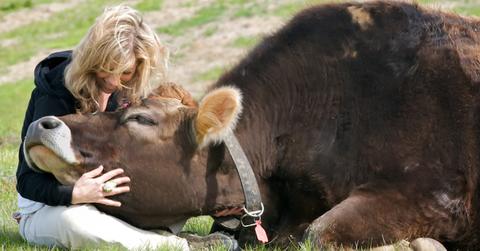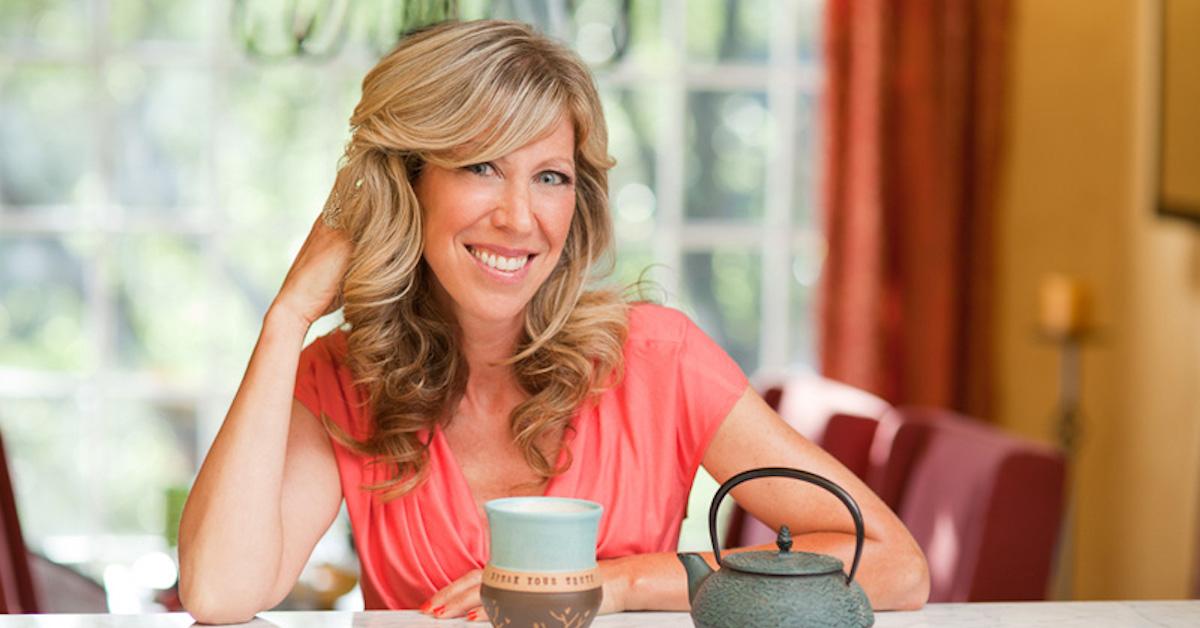Colleen Patrick-Goudreau On How We Will End the Thanksgiving Turkey (Exclusive)
Published Sept. 28 2021, 12:18 p.m. ET

For many Americans, turkeys are practically synonymous with Thanksgiving — someone spends all day cooking the turkey, the bird is the centerpiece on the table, and the holiday is even nicknamed “Turkey Day.” But for vegans, vegetarians, animal lovers, and environmentalists who would like to see the end of the Thanksgiving turkey, trying to express thanks with a massive turkey carcass on the table can be an emotional or frustrating experience.
And even if you convince your family to skip the bird this year, the fact remains that turkeys are typically slaughtered for Thanksgiving at around 4 to 6 months of age, meaning they are first bred for the holiday back in the spring. So while last-minute campaigns are still a positive thing, it’s too late, because the turkeys’ fates are already sealed.
According to Colleen Patrick-Goudreau, renowned author of a handful of vegan books and cookbooks, the weeks leading up to Thanksgiving are actually the perfect time to start campaigning for people to skip eating a turkey at next year’s Thanksgiving. She believes that changing hearts and minds this far in advance is what will actually impact the demand for upcoming years, eventually reducing the supply (aka the amount of turkeys being bred and slaughtered).

“Most people are thinking about Thanksgiving around October … by that time, the turkeys who are being served at that meal... they've already been killed,” Patrick-Goudreau tells Green Matters over the phone. “So the idea is to encourage people to start thinking about it beforehand, and to really lessen the number of turkeys purchased, so that the demand gets lower and so there are fewer animals the next year, etc.”
Patrick-Goudreau’s seventh and most recent book, The Joyful Vegan (which also happens to be her nickname) is a support guide for vegans who want to let go of the sadness and difficulties that sometimes come with being a vegan in a non-vegan world. We recently caught up with Patrick-Goudreau to for her best tips on joyfully making it through Thanksgiving as a non-turkey eater, and to hear how she thinks we will one day end the association between the holiday and eating turkeys.
Start conversations early — ask your family now to pledge to skip the turkey next year.
If a turkey has already been purchased for your dinner this year, consider asking family members to pledge to skip the turkey for next Thanksgiving, “to already start planting the seeds in people's minds this year for next year,” Patrick-Goudreau tells us.
She has noticed that more people are willing to go without a Thanksgiving turkey than one might think — but deciding that just before Thanksgiving isn’t enough to reduce the economic demand. She suggests thanking your family members for understanding your point of view, and saying something like, “You've already made it, but for next year, would you consider not having it, not serving it, not making it, not buying it? And so can we think about next Thanksgiving now? Just to plant that seed.”
Showcase how wonderful turkeys are at your Thanksgiving dinner.
These days, Patrick-Goudreau and her husband share Thanksgiving dinner with a group of vegan friends. But still, she continues the traditions that she’s had for years of honoring turkeys at the meal, which she does by displaying a photo of a turkey she’s met, and by having people go around the table and share stories about turkeys they’ve interacted with.
Patrick-Goudreau likens turkeys to cats, and she thinks that if more people got to interact with the creatures, they would be more likely to stop eating them. She tells Green Matters the story of a sweet turkey named Lydia who she met at a farmed animal sanctuary, who kept repeatedly hugging Patrick-Goudreau. “Those kinds of stories really move people to understand that these are individuals who want to live and who love life, who have their own personalities,” she says.
Offer to create a delicious vegan Thanksgiving centerpiece.
Patrick-Goudreau thinks so many people are so “attached” to eating a turkey at Thanksgiving for two main reasons: Because that’s what most of us are taught (“we can be untaught,” she says), and because the body serves as a focal point on the table. Instead, Patrick-Goudreau suggests creating a squash-based Thanksgiving centerpiece, whether it’s a large pumpkin filled with stuffing, or a platter of roasted acorn squashes or mini pot pies that everyone can share. (There are also plenty of plant-based turkey alternatives on the market.)
Remind others that Thanksgiving is really about community and gratitude, not eating turkeys.
“The turkey has become the symbol for this holiday called Thanksgiving, so what is this holiday called Thanksgiving really about? It's about gratitude, and it's about abundance, the fall harvest … and it's also about community and family and friends,” Patrick-Goudreau says. “So, if we emphasize that, I think people will go, ‘Wait, you're right, this is stupid. Why would I put all of the weight on this one thing, this turkey?’”
If family members resist, have an open conversation and compromise.
Seeing a huge dead animal on a dinner table can be an emotional experience for some vegans, but your family may not realize that. “When you've had a shift in perception, you see suffering, you see, abuse, you see violence,” she explains. “If we haven't shared that with our family members, they just think we're being dictatorial or we're being too emotional or we're trying to make them feel guilty.”
She suggests sharing the feelings that dining near a dead body brings up for you, and then asking questions like, “Why is it so important to you? What does it mean to you why? Why turkey? And why do you feel a resistance to doing something different?” But don’t ask these questions rhetorically; really listen to their answers, and try to find a solution that makes everyone happy.
If your crew refuses to ditch the turkey, Patrick-Goudreau suggests a compromise — ask if the carving and serving of the bird can be done in another room.
Put yourself in their shoes.
It can feel frustrating when your loved ones don’t share your belief that animal exploitation is wrong — and Patrick-Goudreau encourages all vegans to try and look at the situation from a different perspective, to help them become a “joyful vegan” like she is.
“If we can remember that we once didn't understand, we once didn't see, we once only saw animals as commodities or meat, and now we have a different perspective, why wouldn't somebody else in our lives also have that potential?” she says. “Remember that people have the capacity to change, but [don’t get] upset that they don't — that's the secret.”